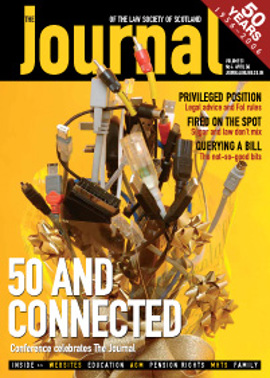Scottish Solicitors' Discipline Tribunal

EILEEN DOMMER
A complaint was made by the Council of the Law Society of Scotland against Ms Eileen Dommer, formerly of Mesdames Eileen Dommer & Company, 87 Commercial Street, Dundee and now at Balmuith Farm, Tealing, Dundee (“the respondent”). The Tribunal found that the respondent had failed to comply with the determination and directions given by the Council of the Law Society of Scotland under section 42A of the Solicitors (Scotland) Act 1980 within the period specified and directed that an order be issued under section 53C of the said Act.
The Tribunal refused the motion to adjourn made by the respondent the day before the hearing. The Tribunal noted that no-one had appeared on behalf of the respondent to make representations in relation to the request for an adjournment. The Tribunal noted the terms of the medical certificate lodged on behalf of the respondent but considered that it was in the public interest for the matter to be disposed of timeously.
CHRISTOPHER JOHN SAYER
A complaint was made by the Council of the Law Society of Scotland against Christopher John Sayer, solicitor, 45 Moray Place, Edinburgh (“the respondent”). The Tribunal found the respondent guilty of professional misconduct in respect of his breach of rules 6, 8, 9, 10, 11, 14 and 24 of the Solicitors (Scotland) Accounts, Accounts Certificate, Professional Practice and Guarantee Fund Rules 2001, his unreasonable delay in recording deeds, his operating with a deficit on his client account and his failure to carry out a quarterly reconciliation of his invested funds. The Tribunal censured the respondent and ordered a restriction on his practising certificate for a period of three years from 27 January 2006.
The Tribunal considered that a lot of the breaches of the Accounts Rules were technical breaches but was concerned that after matters were identified at the first inspection, the respondent continued to act in breach of some of the same rules. The Tribunal was also concerned with regard to the delay in recording deeds, which could have resulted in significant loss to the clients. The Tribunal took account of the numerous references lodged on behalf of the respondent, but given the number of breaches of the Accounts Rules, the Tribunal considered that in order to protect the public the respondent required to work under supervision. The Tribunal imposed the restriction to run from 27 January 2006 to give the respondent time to endeavour to have an employer approved by the Society so that he could continue to work.
In this issue
- Bias and mental health tribunals: a reply
- Legal science or law-lite? A response (1)
- Opening a binding global route for personal data
- Mentally disordered offenders
- Change but not for the sake of it
- Legal science or law-lite? A response
- On message
- A bill to query
- Client confidentiality and freedom of information
- Rushed law and wrongful death
- Qualifying by degrees
- Safeguards before the MHTs
- The treatment of pension rights on divorce
- We've paid for it: what do you mean it's not ours?
- Communication: the #1 risk management tool?
- Sugar but not sweet
- AGM report
- Guidance on guidelines
- The licensed trade: going up in smoke?
- Clause for concern
- Fully charged
- Scottish Solicitors' Discipline Tribunal
- Website reviews
- Book reviews
- New CAR drives discharge regime






